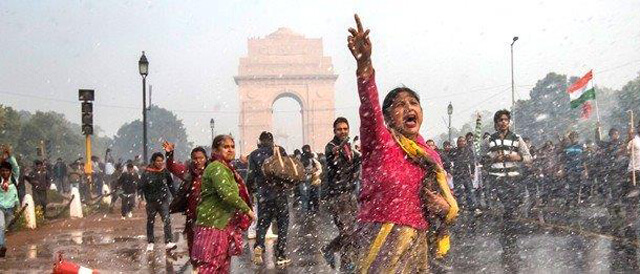This article is written by Upasana Dash, from Madhusudan Law College, Odisha. This is a comprehensive article which deals with the various issues regarding the banning of BBC’s documentary “India’s Daughter”.
Table of Contents
Introduction
India’s daughter is a documentary movie directed by the famous director Leslee Udwin, which was constructed upon, the sensational Delhi gang-rape case on December 16. 2012. A 23-year old physiotherapy student was brutally gang-raped and murdered in Delhi. The British Broadcasting Corporation has made a documentary, explaining the occurrence of that winter night on December 16, 2012, the protests which were raised both at national and international platforms and the lives of man before they committed the attack. The documentary has shown several interviews with the victim’s family members, one of the accused persons (Mukesh Singh), including defense lawyers, psychiatrists.
Leslee Udwin’s documentary offered a relaxing account of the 2012 gang rape and murder of a young girl in India. As revealed in films and by a list of upsetting international figures concerning sexual abuse and violence against women, their experiences have a tender significance well beyond India. And while Udwin’s directing debut has been outlawed from proposing in that England. It should keep up to agitate healthy affront abroad with its unsharpened, conflictual significant global attention. The barbaric cumulative mindset they document here is shown to be as ungovernable as it is deeply settled.
Background of the documentary
Jyoti Singh was returning to her home after watching the movie Life of Pi dated 16th December 2012 with her friend Awindra Pratap Pandey. They took a private bus carrying other men. Those six men were beaten brutally and inhumanly raped her with several injuries on her body. Consequently, Jyoti Singh (2012 Delhi gang rape and murder) died 29th December exactly after 13 days at Singapore Hospital.
The director’s most contentious and captivating blow was her resolve to turn the camera on the convicted person Mukesh Singh, who rests in his view that he did nothing wrong to that young woman, a girl was far more responsible for her rape than a boy. He had added more, that a girl should not roam around at night with a male friend who is not a family member. Furthermore, the defense lawyer was of the thought that women are flowers, their purity and beauty should be kept protected.
Hence, Udwin pulled up a more positive, logic pointing out how the victim and the hostility in modern India. We see in these poor surroundings and slum areas how deeply lack of means, education, and culture can influence the mindset of persons from where those rapists came from. On the other hand people like Jyoti, an ambitious well-educated girl, who was pursuing a medical degree and worked long hours at an international call center to help herself. So this lack in the hierarchy of education and upbringing affects terribly in the mindset of human beings. Similarly, her modern mentality parents, Badri, and Asha contribute to the film’s most deadly moments as they admiringly remember their daughter who was taken from them.
This mishappening got widespread media publicity. It was activated by worldwide protests and criticism of the Indian Government for not giving sufficient protection to women. India’s Daughter had been on the front line of news. It had been trending on social media also. International media captured this event only after constant public protocol. Former Home Minister Mr. Rajnath Singh said that the whole nation is ashamed by the convict Mukesh Singh’s statements. Initially, some leading Indian feminists agreed on grounds that the rapist should not be allowed to give such derogatory opinions on such a huge platform.
Including a 17-year old juvenile, six men were accused of the assault. One accused person was found dead in the imprisonment cell, he committed suicide through his relatives claimed that this was a murder. The rest five accused persons were proved to be convicted and the death sentence had been passed, where the juvenile was given 3 years of punishment under the Juvenile Justice Act.
Production and release
Leslee Udwin as a Human Rights Activist interest in making the films was provoked at first by the extensive number of people who protested in India for over a month in reaction to the rape of Jyoti Singh. She wished to give help to the protester, a policy on which their voice would be accepted globally. Moreover, Udwin had a wish to know the mindset of rapists, wondering why a person commits rape. She was determined that the documentary must imply interviews with the convicted person and initially focused her attention completely on the rape of Jyoti Singh an outlook spread in later days.
To start with Udwin approached the director-general of the Tihar jail to ask him to grant an interview with the rapist Mukesh Singh, she ought to know what is the reason behind raping a woman. One of the rapists refused to talk to her, subsequently, Vinay Sharma and Pawan Gupta denied their participation, excusing that they were not present on that bus. The Bus driver Mukesh Singh agreed to answer her questions and for this reason, the interview was attached to the film.
In the beginning, the film was going to be released on the BBC on 8th March on International Women’s Day in 2015 but was outlawed due to the Minister of Home Affairs (India) declared that Leslee Udwin had not obtained permission to interview one of the convicted person in prison or permit authorities to see a genre of that interview. Later India’s Daughter was allowed to release in the U.S theatre on October 23rd, 2015.
Criticism and ban in India
Some spokespersons claimed that the purpose of this documentary was merely trying to conspire against India on an international platform. Our former finance minister Arun Jaitley was confronted in an interview that the BBC documentary is violating the law of India as well as in England too. Under Section 228A of IPC, the identification of the victim must not be exposed to the public, but the director was not concerned with our legislative system. This is clear infringing or ultra vires to our criminal law system. Because in that film the director had exposed the name of the victim as well as photographs of that victim. Indian procedures have been done, no doubt he would be prosecuted. Proprietary and law of allowing a forum to be made available to a rapist during the pendency of his trial and making this program available to him against why he is not guilty. Ironically, the accused appeal was pending at that time.
The documentary was outlawed because there was a possibility of huge outrage in public. People with a criminal mindset may get influenced. Some also criticized the purpose of the movie as being a little hazy. Feminist Activist Kavita Krishnan said that the film supports a very patriarchal aspect. Venkaiah Naidu stated that “a conspiracy to defame India.”
On the other side, those statements were given by the accused Mukesh Singh brought a huge public screaming in India. On 3rd March Delhi police filed a report against the filmmakers under IPC Section 504, Section 505 in the Indian Penal Code – Indian Kanoon, Section 509 in the Indian Penal Code – Indian Kanoon and, Section 66A of the Information Technology Act.
Those videos of interviews had created so much offensive content as well as broken peace of public order. So to maintain peace and order, a petition was filed in Court to ban publishing and broadcasting the movie in India. India’s former Home Minister Rajnath Singh (2014-19) in his interview stated that Indian culture and tradition are very concerned about the dignity of women. No group or organization for their commercial benefit can not broadcast their documentary, we strongly condemn the incident of December 16, 2012. The authority has outlawed it on the ground of “objectionable content”. It said that it was an insult to the Apex Court of India to suggest publishing “a perverted view” of the rapist would interrupt the system of justice.
The Editorial director Sonia Singh explaining the order not to broadcast had tweeted that “we won’t shout, but we will be heard”. The director of BBC television, Danny Cohen stated that the corporation has given his ascent to show the film in the UK, by disregarding an approach from Indian Authority that it abolishes the broadcast. He said, “we do not feel that the film as currently edited could ever be construed as derogatory to women or an affront to her dignity.”
Refusal to lift the ban
Leslee Udwin confronted the allegation that she broke the contract with the prison by turning up the interview with the criminal, convicted in the Delhi Bus Rape, 2012. She added legal actions of India on kicking out the documentary had no feasible means. The film had been banned in India, but NDTV had broadcasted the movie in the UK. In the interview, Mukesh Singh had suggested she might have survived if she had not fought back. The authority of Tihar jail, who allowed her for the interview claimed that she had broken the contract by not permitting officials to assess her video clips. Udwin confessed to the BBC that she had written an application to the jail authority and they allowed her with proper guidelines. She added she had got signed permission from the Ministry of Home Affairs and the convicts as well. She told a news channel that she had submitted an edited version, which she has approved. She said she was convinced the ban on the movie would be overruled in the Delhi High Court. However, in later days Laslee Udwin approached Indian Prime Minister Narendra Modi to elevate the ban on March 4, 2015.
Public interest litigation was filed in Delhi High Court to elevate the ban, claiming that the ban on broadcasting is violating Article 19 in the Constitution Of India. Since the trial of the convicts was pending in the Supreme Court of India, the petition was denied on 12th March 2015. On March 20, 2020, the Supreme Court passed an order for the death sentence to those convicts.
Issues raised by the documentary
There are several issues raised by the controversial documentary through the Indian Government and #The censor board has overshadowed the aim of the film and worldwide protests against it as well. Anyhow, the very crucial issues raised was gender discrimination, sexual harassment, some norms and folkways which violent crimes specifically against women. Another vital context was this movie may give voice to one of the unrepentant rapists.
We live in a conservative society where girls are judged by the length of the skirt, with whom and what time she is roaming around. The so-called male society narrates a girl’s character for having a male friend, they frame her as a slut.
Education should be our priority to change this typical mindset. One should equally respect irrespective of the gender of the person. Every 20 minutes, a girl is raped in India. Despite having vast and exhaustive rules and regulations, laws are silent in this context. The defense lawyer A.P Singh also stated a very nauseated view on this sensitive event.
Our sociological perception needs to be swapped regarding such troublesome and heinous consequences. Women are prejudiced here. A rape-free society is a utopia. In Indian culture, we worship goddesses and in this phase, we disgrace a woman’s status by assassinating her character. It’s a film about distressingly sad conditions of malice and violence concerning women, children, LGBT, poor people of every religion.
Conclusion
The documentary was a wake-up call for Indian society though to some extent this has violated the laws of India. But the question is “Are women safe?” “Do the laws and regulations are sufficient enough to give security to a woman and her dignity ?” our laws should keep an eye on gender discrimination, race and communal differences, societal bullying, disparaging views towards a girl irrespective of her religion and without making this a political propaganda. Lastly, a question, is justice served to Nirbhaya, in a real sense? She had lost her well-prospered career, reputation, and life.
LawSikho has created a telegram group for exchanging legal knowledge, referrals and various opportunities. You can click on this link and join:
 Serato DJ Crack 2025Serato DJ PRO Crack
Serato DJ Crack 2025Serato DJ PRO Crack











 Allow notifications
Allow notifications


